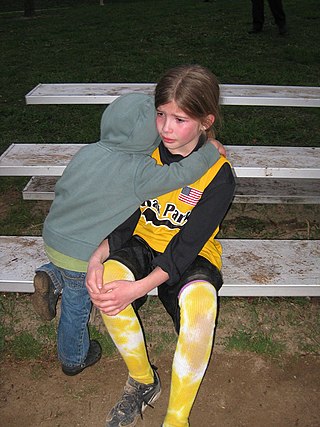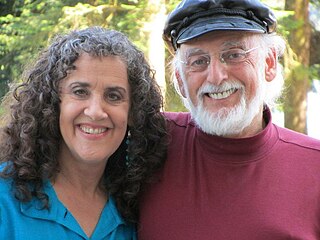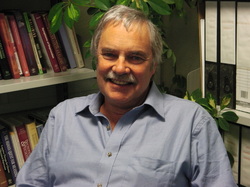Love encompasses a range of strong and positive emotional and mental states, from the most sublime virtue or good habit, the deepest interpersonal affection, to the simplest pleasure. An example of this range of meanings is that the love of a mother differs from the love of a spouse, which differs from the love for food. Most commonly, love refers to a feeling of strong attraction and emotional attachment.

In psychology, codependency is a theory that attempts to explain imbalanced relationships where one person enables another person's self-destructive behavior such as addiction, poor mental health, immaturity, irresponsibility, or under-achievement.

Forgiveness, in a psychological sense, is the intentional and voluntary process by which one who may have felt initially wronged, victimized, harmed or hurt goes through a process in changing feelings and attitude regarding a given offender for his/her actions, and overcomes the impact of the offense, flaw or mistake including negative emotions such as resentment or a desire for vengeance. Theorists differ in the extent to which they believe forgiveness also implies replacing the negative emotions with positive attitudes, or requires reconciliation with the offender. In certain legal contexts, forgiveness is a term for absolving someone of debt, loan, obligation, or other claims. Such legal usage can also be thought of as mercy, being distinct from forgiveness.

Compassion is a social feeling that motivates people to go out of their way to relieve the physical, mental, or emotional pains of others and themselves. Compassion is sensitivity to the emotional aspects of the suffering of others. When based on notions such as fairness, justice, and interdependence, it may be considered partially rational in nature.

The cycle of abuse is a social cycle theory developed in 1979 by Lenore E. Walker to explain patterns of behavior in an abusive relationship. The phrase is also used more generally to describe any set of conditions which perpetuate abusive and dysfunctional relationships, such as abusive child rearing practices which tend to get passed down. Walker used the term more narrowly, to describe the cycling patterns of calm, violence, and reconciliation within an abusive relationship. Critics suggest the theory was based on inadequate research criteria, and cannot therefore be generalized upon.
Couples therapy attempts to improve romantic relationships and resolve interpersonal conflicts.

Resentment is a complex, multilayered emotion that has been described as a mixture of disappointment, disgust and anger. Other psychologists consider it a mood or as a secondary emotion that can be elicited in the face of insult or injury.

John Mordechai Gottman is an American psychologist, professor emeritus of psychology at the University of Washington. His work focuses on divorce prediction and marital stability through relationship analyses. The lessons derived from this work represent a partial basis for the relationship counseling movement that aims to improve relationship functioning and the avoidance of those behaviors shown by Gottman and other researchers to harm human relationships. His work has also had a major impact on the development of important concepts on social sequence analysis. He and his wife, psychologist Julie Schwartz Gottman, co-founded and lead a relationship company and therapist training entity called The Gottman Institute. They have also co-founded Affective Software Inc, a program designed to make marriage and relationship counseling methods and resources available to a larger audience.
Complex post-traumatic stress disorder is a stress-related mental disorder generally occurring in response to complex traumas, i.e., commonly prolonged or repetitive exposures to a series of traumatic events, within which individuals perceive little or no chance to escape.

Buddhism includes an analysis of human psychology, emotion, cognition, behavior and motivation along with therapeutic practices. Buddhist psychology is embedded within the greater Buddhist ethical and philosophical system, and its psychological terminology is colored by ethical overtones. Buddhist psychology has two therapeutic goals: the healthy and virtuous life of a householder and the ultimate goal of nirvana, the total cessation of dissatisfaction and suffering (dukkha).
The developmental needs meeting strategy (DNMS) is a psychotherapy approach developed by Shirley Jean Schmidt. It is designed to treat adults with psychological trauma wounds and with attachment wounds. The DNMS is an ego state therapy based on the assumption that the degree to which developmental needs were not adequately met is the degree to which a client may be stuck in childhood. This model aims to identify ego states that are stuck in the past and help them get unstuck by remediating those unmet developmental needs. The processing starts with the DNMS therapist guiding a patient to mobilize three internal Resource ego states: a Nurturing Adult Self, a Protective Adult Self, and a Spiritual Core Self. The therapist then guides these three Resources to gently help wounded child ego states get unstuck from the past by meeting their unmet developmental needs, helping them process through painful emotions, and by establishing an emotional bond. The relationship wounded child parts have with these Resources is considered the primary agent for change.
In psychology, self-compassion is extending compassion to one's self in instances of perceived inadequacy, failure, or general suffering. American psychologist Kristin Neff has defined self-compassion as being composed of three main elements – self-kindness, common humanity, and mindfulness.
Emotionally focused therapy and emotion-focused therapy (EFT) are a set of related approaches to psychotherapy with individuals, couples, or families. EFT approaches include elements of experiential therapy, systemic therapy, and attachment theory. EFT is usually a short-term treatment. EFT approaches are based on the premise that human emotions are connected to human needs, and therefore emotions have an innately adaptive potential that, if activated and worked through, can help people change problematic emotional states and interpersonal relationships. Emotion-focused therapy for individuals was originally known as process-experiential therapy, and it is still sometimes called by that name.
Transference focused psychotherapy (TFP) is a highly structured, twice-weekly modified psychodynamic treatment based on Otto F. Kernberg's object relations model of borderline personality disorder. It views the individual with borderline personality organization (BPO) as holding unreconciled and contradictory internalized representations of self and significant others that are affectively charged. The defense against these contradictory internalized object relations leads to disturbed relationships with others and with self. The distorted perceptions of self, others, and associated affects are the focus of treatment as they emerge in the relationship with the therapist (transference). The treatment focuses on the integration of split off parts of self and object representations, and the consistent interpretation of these distorted perceptions is considered the mechanism of change.
A narcissistic parent is a parent affected by narcissism or narcissistic personality disorder. Typically, narcissistic parents are exclusively and possessively close to their children and are threatened by their children's growing independence. This results in a pattern of narcissistic attachment, with the parent considering that the child exists solely to fulfill the parent's needs and wishes. A narcissistic parent will often try to control their children with threats and emotional abuse. Narcissistic parenting adversely affects the psychological development of children, affecting their reasoning and their emotional, ethical, and societal behaviors and attitudes. Personal boundaries are often disregarded with the goal of molding and manipulating the child to satisfy the parent's expectations.
Trauma bonds are emotional bonds that arise from a cyclical pattern of abuse. A trauma bond occurs in an abusive relationship wherein the victim forms an emotional bond with the perpetrator. The concept was developed by psychologists Donald Dutton and Susan Painter.
Abusive power and control is behavior used by an abusive person to gain and/or maintain control over another person. Abusers are commonly motivated by devaluation, personal gain, personal gratification, psychological projection, or the enjoyment of exercising power and control. The victims of this behavior are often subject to psychological, physical, mental, sexual, or financial abuse.

Paul Raymond Gilbert is a British clinical psychologist. Gilbert is the founder of compassion focused therapy (CFT), compassionate mind training (CMT) and the author of books such as The Compassionate Mind: A New Approach to Life's Challenges and Overcoming Depression.
Compassion-focused therapy (CFT) is a system of psychotherapy developed by Paul Gilbert that integrates techniques from cognitive behavioral therapy with concepts from evolutionary psychology, social psychology, developmental psychology, Buddhist psychology, and neuroscience. According to Gilbert, "One of its key concerns is to use compassionate mind training to help people develop and work with experiences of inner warmth, safeness and soothing, via compassion and self-compassion."
Intrapsychic humanism is a comprehensive general psychology and philosophy of mind that provides a new understanding of what it is to be human. Intrapsychic humanism is a nonderivative depth psychology that provides a unified and comprehensive theory of child development, psychopathology, and psychological treatment.







